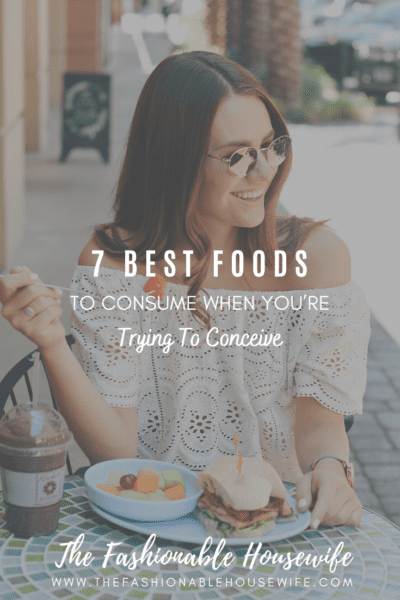
Make no mistake about it: food makes a huge impact on your chances of conceiving, and so it’s important that both you and your partner have a balanced and healthy diet. If you eat well, avoid alcohol, refrain from smoking, and maintain a healthy weight, these things all improve your chances and help set the optimum conditions for developing a baby.
While you’re consuming your pre-pregnancy diet, track your ovulation too for maximum results. If you don’t know how ovulation trackers work, undertake some research so you’re super clued up.
Let’s look at the best food to consume while you’re trying to conceive and preparing your body for pregnancy:
Starchy foods
Foods high in starch, like bread, rice, and potatoes, are good in moderation to help achieve a balanced diet. Opt for their wholegrain varieties, like wholewheat pasta, to boost the fibre you’re consuming, as well as your calcium, iron, and B vitamins. Wholegrain foods also help you feel fuller for longer – bonus!
Fruits and veg
Sounds a little basic, but fruit and vegetables are really important to consume when you’re trying to conceive. Whether it’s fresh, frozen, or tinned, five portions a day are recommended, but remember to mix them up – variety is key.
Milk and dairy foods
It’s best to avoid unpasteurized milk and cheeses when you’re pregnant, so you might as well start this while you’re trying to conceive too! Milk and dairy foods have proven health benefits for conceiving, so try two to three portions of milk, yogurt or cheese a day. Try the lower-fat versions to maintain a healthy BMI when you are trying to conceive.
Folic acid-rich foods
It is recommended that women take folic acid daily for at least one month before trying to conceive. As well as taking prenatal vitamins, you can also find folic acid in foods. Leafy green vegetables, like spinach, broccoli, and kale, are great options. Oranges and strawberries are also easy and yummy to incorporate into your pre-pregnancy diet.
Iron-rich foods
Iron shuttles oxygen throughout your body, so it’s super important to stock up when you are trying to conceive. Good sources of iron include fortified cereals (one serving contains 18mg of iron), lean meats like beef, chicken, and turkey (containing around 1mg of iron per 3 ounce serving), and spinach (1/2 cup of boiled spinach contains around 17% of your daily recommended iron intake!).
Omega-3 fatty acids
Fats don’t have to be bad for you! In fact, omega-3 fatty acids help to regulate your key ovulation-inducing hormones and increase the blood flow to the reproductive organs so they are especially important when you are trying to conceive. Whilst saturated fats and trans-fats are a no-no, you can find omega-3 fatty acids in whole foods like seafood, grass-fed beef, and nuts and seeds.
Sources of protein
If you’re trying to conceive, make sure you’re eating two to three servings a day of protein, with one being plant-based. We suggest healthy fish like salmon, lean meats like chicken and turkey, and black beans. Nuts, seeds, and legumes are also great choices for your plant-based protein fix.
If you are trying to increase your chances of conceiving, take time to get to know your body, the signs your body gives you that ovulation is about to occur, and be sure to use a fertility tracker to help you out!



